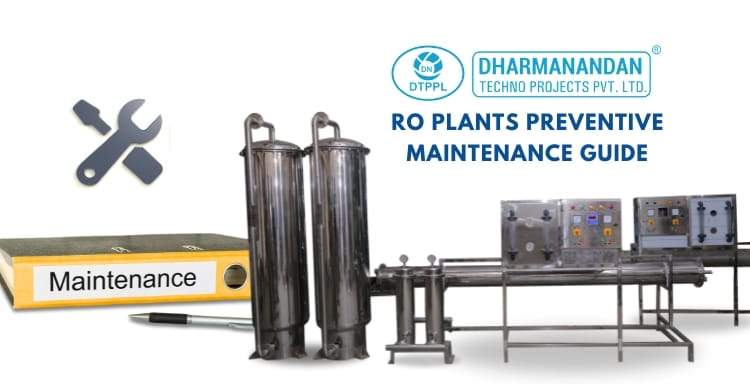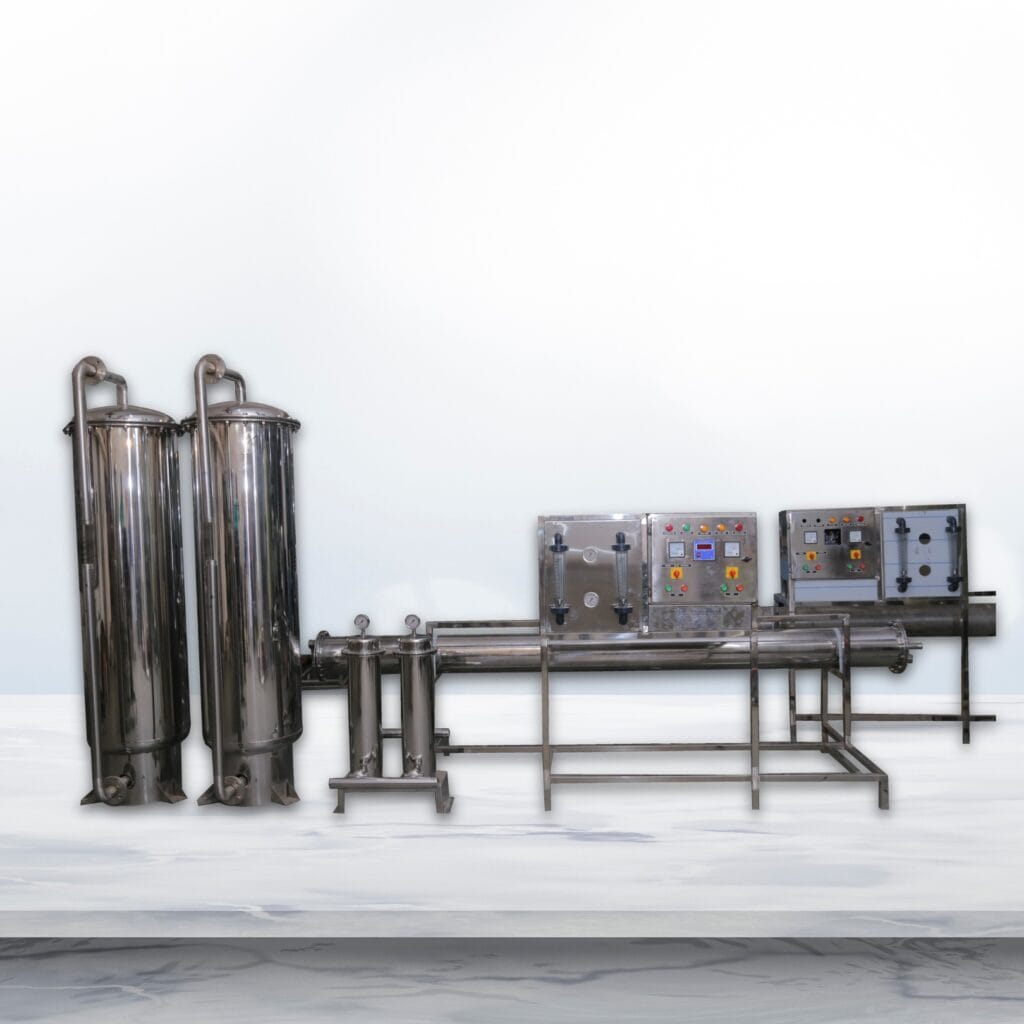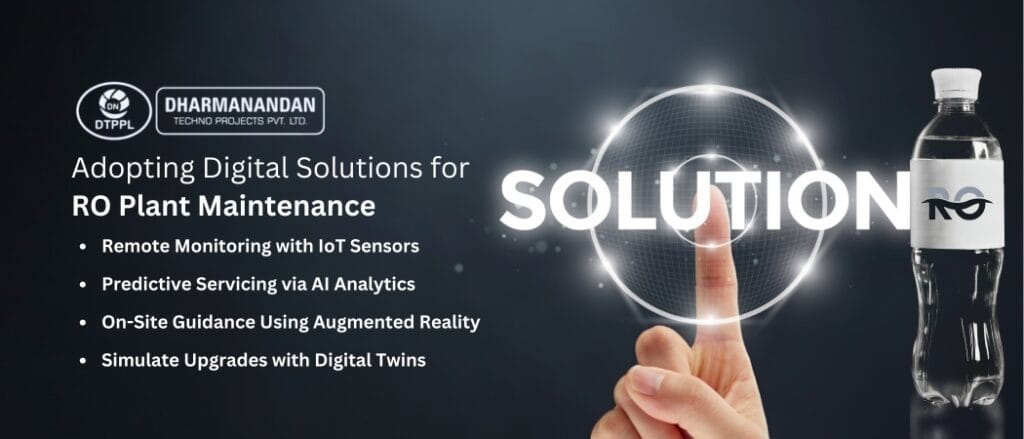
Table of Contents
Preventive Maintenance Tips for RO Plants: Practical Guidance for Long-Term Reliability
April 21, 2025
Preventive maintenance plays a key role in ensuring the continuous and reliable performance of any RO Plant, whether it’s a Commercial RO Plant serving packaged water production or a high-capacity Industrial RO Plant used in manufacturing or utilities. A well-maintained RO water plant not only minimizes operational downtime but also reduces costs associated with emergency repairs, membrane replacement, and inefficient energy usage.
As an experienced RO Plant Manufacturer, DTPPL shares this structured guide based on industry best practices and real-world insights to help plant operators, technicians, and business owners establish a sustainable and effective preventive maintenance routine.

Common Challenges Faced in RO Water Plants
Understanding past issues helps prevent future disruptions. Below are some recurring problems observed in both commercial RO plants and industrial RO systems.
Membrane Fouling
This is one of the most frequent challenges across all types of Reverse Osmosis plants.
- Scaling from calcium or sulfate buildup
- Biofouling from bacterial growth
- Organic fouling from natural matter
- Colloidal fouling from suspended solids
These issues typically lead to reduced permeate flow, increased energy consumption, and early membrane replacement.
Pump Failures
Pumps are critical to maintain pressure across the RO Plant Water system. Issues like cavitation, worn seals, and motor imbalance can affect production continuity.
Pre-Treatment Inefficiency
Insufficient or delayed pre-treatment, such as backwashing filters, can result in higher fouling on the RO membranes.
Instrumentation Drift
Sensor calibration errors, faulty probes, or aged monitoring systems can produce incorrect data, leading to poor decisions or missed maintenance triggers.
Chemical Dosing Issues
Malfunctions in chemical dosing pumps or inconsistent concentration of antiscalants and disinfectants can affect water quality and membrane life.
Leakages
Over time, pipe joints, valves, and fittings may develop leaks due to pressure changes, scaling, or chemical exposure.
Predictive Maintenance for Modern RO Plants
While routine checks are essential, adding data-based monitoring can take your maintenance program a step further. Leading Industrial RO System Manufacturers and operators now rely on predictive techniques to reduce unplanned shutdowns.
Key Parameters to Monitor
- Flow Rates (feed, permeate, concentrate)
- Feed Pressure & Differential Pressure
- Conductivity/TDS
- pH & ORP
- Temperature & Turbidity
- Chlorine levels
- Silt Density Index (SDI)
- Pump vibration & motor current
Tracking these parameters daily helps anticipate changes in membrane performance or mechanical efficiency.
Learn More Information About Reverse Osmosis Plants
Tools That Support Predictive RO Plants Maintenance
- SCADA systems or cloud-based dashboards
- Real-time data logging
- Sensor-based alerts for deviations
- Trend analysis for flow decline or salt rejection
- Scheduled calibration based on usage instead of fixed dates
This approach reduces unnecessary component replacements and helps optimize your overall RO plant investment.

Preventive RO Plants Maintenance Checklist: What to Do and When
Here’s a practical maintenance schedule for both Commercial RO Systems and Industrial RO Plants, customized to help extend the equipment life and avoid downtime.
Daily
- Check and record flow, pressure, TDS, temperature, and pH readings
- Visually inspect for leakages or unusual noises
- Ensure dosing pumps are working correctly and chemicals are at the correct levels
- Look for early signs of vibration or sensor alerts
Weekly
- Backwash multimedia or sand filters as per pressure drop
- Inspect cartridge filters; replace if pressure exceeds design limit
- Conduct SDI testing
- Inspect pump seals and check motor temperature
Monthly
- Review permeate quality and salt rejection rates
- Clean RO membranes if pressure drop or flow reduction indicates fouling
- Calibrate sensors and meters
- Confirm dosing accuracy and recalibrate chemical pumps if needed
Quarterly
- Conduct in-depth pump inspection (bearings, seals, impellers)
- Examine all valves for wear, leaks, or slow response
- Inspect chemical tanks and delivery lines
- Clean storage tanks, especially in packaged RO water plant setups
Annually
- Perform a membrane autopsy if performance has significantly declined
- Inspect and test motors and electrical panels
- Review and update the maintenance plan
- Schedule external audits if needed
- Review compliance for certifications such as fssai license for RO water plant (where applicable)
Supporting Reverse Osmosis Plant Maintenance Best Practices for Execution
Preventive maintenance must be supported by reliable systems, trained personnel, and documented processes. Here’s how:
- Use a CMMS (Computerized Maintenance Management System) for task tracking
- Train staff to follow equipment manuals and SOPs
- Maintain a logbook of all maintenance activities and performance metrics
- Stock critical spares like cartridge filters, pump seals, and cleaning chemicals
- Follow safety protocols for chemical handling and high-pressure equipment
If you operate a Commercial RO Plant Exporter facility or a global Industrial RO Plant Supplier, these practices also support traceability and quality assurance.
Adopting Digital Solutions For Reverse Osmosis Plant Maintenance
Modern RO plants manufacturers are integrating smart tools to improve visibility and control.
- IoT sensors track system health remotely
- AI-based analytics identify trends for predictive servicing
- Augmented Reality tools guide technicians on-site
- Digital twins allow simulation before changes are implemented
If you are evaluating ro water plant setup cost for a new installation or optimizing an existing setup, consider adding these features as part of your investment.

Reverse Osmosis Plant Stainless Steel
Capacity: 1000 LPH to 50,000 LPH
(USD 4,500 to USD 10,700)
Conclusion: Long-Term Success Through Routine RO Plant Care
A thoughtful preventive maintenance plan can reduce operational costs, extend the lifespan of your industrial RO water purifier system, and ensure steady water quality. Whether you’re a RO plants manufacturer, a facility manager, or exploring new ro water plant business opportunities, preventive care is essential for consistent performance.
DTPPL: Your Renowned Reverse Osmosis Plant Manufacturer & Supplier
At DTPPL, we build more than just machines—we support the long-term success of every RO Plant we deliver. As a trusted Industrial RO Plant Exporter, Commercial RO Plant Manufacturer, and Industrial RO System Supplier, we help our clients set up reliable systems and maintain them efficiently.
Need a preventive maintenance checklist tailored to your setup?
Get in touch with DTPPL today to ensure your plant operates at its best—for years to come.
About Author

Director – Global Marketing and Sales
Mr. Bhavesh from Dharmanandan Techno Projects Pvt. Ltd. has played a pivotal role in elevating the DTPPL brand to the global stage, leveraging his exceptional expertise in marketing and communications. He is committed to helping clients achieve significant growth while strengthening their own brands. Dharmanandan Techno Projects Pvt. Ltd. is a leading manufacturer and supplier of water purification systems and turnkey solutions for mineral water plants. With years of experience in designing and delivering high-quality water treatment solutions, the company provides end-to-end services, including system design, installation, maintenance, and ongoing support. Specializing in scalable and customizable water plants, DTPPL has successfully served industries worldwide, ensuring clean and safe drinking water across diverse applications.





